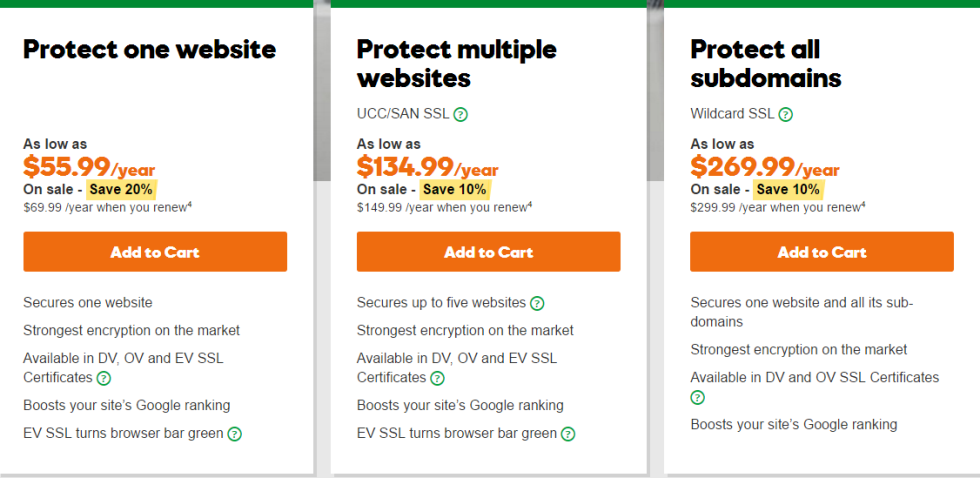Among many other SSL certificates we have tried recently, we have found Godaddy SSL certificate not only as one of the cheapest in the market but also among the best in terms of offering the expected layered protection and security SSLs are meant to provide. Therefore, we have taken the liberty of compiling these Godaddy SSL coupon codes to help you save even more money on what is already one of the cheapest among the top and highly recommended SSL providers. These Godaddy SSL certificate coupon codes are tested regularly to ensure that they still work and deliver the expected level of savings.
Godaddy SSL Coupon Code: GET 25% OFF All GODADDY SSL CERTIFICATES.
Use this coupon code to save 25% on SSL certificates. This has been tested and it currently works.
Save 30% Off New Products with this Godaddy Coupon
This coupon code will save you 30% off all new products including SSL Certificates. We recommend you use this coupon code if you are ordering a lot of items at once as it gets you more savings.
Save 28% Off Your Order with this Godaddy Promo Code
You will get 28% off your total order, whether it is SSL certificate order, domain name or renewal order.
GET 30% off Godaddy's new products and services with this Godaddy promo code
Please note that the SSL coupon codes specified above only work for standard SSL certificates. If you are looking for Wildcard SSL coupon or UCC coupon, we recommend that you use the 30% off Godaddy's new products and services coupon codes which delivers even more savings.
Everything You Should Know About Godaddy SSL Certificate
What is SSL certificate?
Who should use SSL certificates?
SSL and Google ranking
Common mistakes to avoid during SSL installation
How to test your SSL certificate after installation
Godaddy SSL certificate plans
What is SSL certificate?
SSL certificate is a digital certificate issued to websites/domains which authenticates its identity and ensures the encryption (secure connection) of the link between a server and a client which in most cases is usually between a web sever and a browser. SSL certificate when added to a website, ensures that personal and sensitive information stays safe from prying eyes and information scouting software like phishing programs.
Who Should Use SSL Certificates?
SSL certificates are becoming increasingly relevant among businesses with online presence. It is now a pre-requisite for websites and web portals that handle online transactions where it is absolutely necessary to ensure security of data (especially financial and personal information) transferred between the website and its server.
These days, even when you don’t handle online transactions on your website, you should still consider adding SSL (Secure-Socket Layer) certificate to your website. This reassures your website's visitors that their data and any personal information eg: email addresses, contact phone numbers and addresses, biodata, or any
credit and debit card details sent across your website is safe.
SSL certificates is a must for these category of platforms:
- Online stores and e-commerce websites (i.e. shopify, woocommerce store fronts)
- Social Networks (Facebook, Twitter)
- Search Engines (Google, Bing)
- Payment handling/processing platforms
- Survey and online form submission platforms where sensitive information are submitted.
If your website is such that does not allow users and site visitors to submit their details, then you may not have a need for SSL certificate. Example of websites in this category are news websites and essay websites which does not allow users to submit their information however, you may also benefit from Google search boost (we will highlight more on this later in this article).
Does SSL Affect Google Search Ranking?
Not long ago, Google spearheaded “HTTPS everywhere” campaign online asking webmasters to add SSL to their websites irrespective of the category or niche. The search giant revealed that it has included SSL as part of their ranking algorithms and although it's weight is still lower than some other ranking factors such as high quality content, they may subsequently increase it's significance in search results most especially as thy are seeing promising results.
How Google Ranks Websites with SSL Certificates
“For these reasons, over the past few months we’ve been running tests taking into account whether sites use secure, encrypted connections as a signal in our search ranking algorithms. We've seen positive results, so we're starting to use HTTPS as a ranking signal. For now it's only a very lightweight signal — affecting fewer than 1% of global queries, and carrying less weight than other signals such as high-quality content — while we give webmasters time to switch to HTTPS. But over time, we may decide to strengthen it, because we’d like to encourage all website owners to switch from HTTP to HTTPS to keep everyone safe on the web”
Although the weight of SSL in google's ranking algorithm is still small, no one knows if they will make it more significant and when that may likely take place if ever it will but there may be need to add SSL to your website if you want to stay competitive in search results.
Common Mistakes to Avoid During SSL Installation
- You would want to make sure that the website you want to certify is installed at the root domain if you want to purchase a standard SSL. If the website is a subdomain, you may want to purchase a Unified Communications Certificate (UCC) SSL certificate which secures multiple domain names and multiple host names (up to a total number of 99) within a domain name. The disadvantage with this is that when the certificate is viewed, it will present only the main domain name rather than listing each individual domain but this is a lot cheaper than having to buy different SSL for each domain variation and remember you can always use our Godaddy SSL promo code to get instant 25% saving on SSL certificates.
- Also remember to change the elements of your website such as your image urls to the HTTPS version otherwise, you will have a the padlock displayed on the browser but it would have a warning icon over it. This does not mean that the relevant parts of your website are insecure but your site's visitors who come across this may develop a bit of skepticism – something that SSL is developed to prevent in the first place.
- Don't forget to test your SSL after installation. The very first time I installed an SSL, I didn't realize I needed to cross-check to make sure the job I did was working as it should and so had my site still without the encryption for a couple of days while I has all patting myself on the back for a “job well done”
How to Test your SSL Certificate After Installation
You definitely want to test your SSL to make sure everything is working as it should and conducing a test as basic as typing your website on a browser is a good way to start. Just enter “https://your-domain.com” into the browser address bar and look for the padlock (or Green Address Bar if you purchased EV Certificates). To run a bit more in-depth test that will allow you to view your certificate and the information it holds, Qualys SSL Labs has created a free secure tool you can use. All your information are kept confidential.
Godaddy SSL Certificate Plans
 All Godaddy SSL plans include the following:
All Godaddy SSL plans include the following:
- Award winning web security and support 24/7 availability
- Strongest encryption on the market (SHA-2 and 2048-bit encryption)
- Compatibility with all major browsers as a trusted certificate provider
- Protects unlimited servers
- Unlimited free re-issues (Should you need to make a change to your SSL Certificate – maybe you need to change the domain your SSL secures, rekey your Certificate or change the signature algorithm – we’ll make the changes and reissue your SSL at no cost. It’s free every time.)
- Up to USD $1M liability protection
- EV SSL turns browser bar green
- Displays a Security Seal on your site
- 30-day money back guarantee (risk free)













